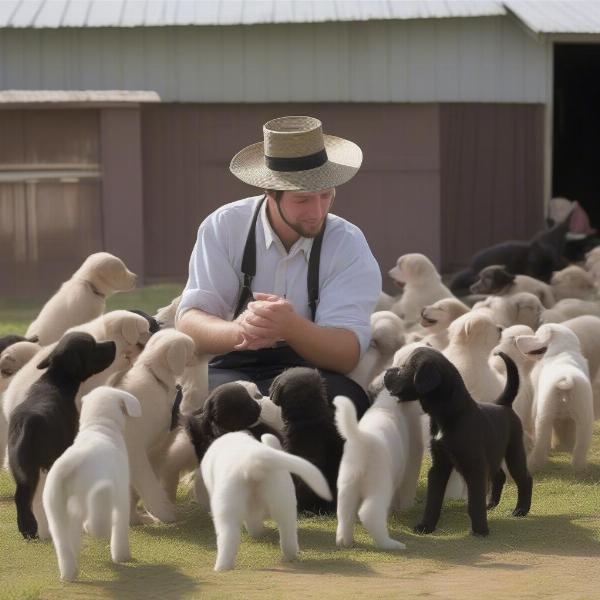Amish breeding dogs is a topic that sparks curiosity and raises questions about animal welfare, breeding practices, and the unique cultural context of Amish communities. This article explores the nuances of Amish dog breeding, examining their motivations, typical practices, and the ethical considerations that arise. We will delve into the potential benefits and drawbacks of acquiring a dog from an Amish breeder, providing you with a comprehensive overview to make informed decisions.
Understanding Amish Dog Breeding Practices
Amish communities often engage in dog breeding as a means of supplementing their income and utilizing their agricultural skills. Their breeding practices are typically characterized by a more traditional, less commercially-driven approach. While some Amish breeders prioritize responsible practices and the well-being of their animals, others may prioritize profit, leading to potential concerns about overbreeding and inadequate care. It’s essential to approach this topic with nuance, understanding that generalizations about Amish breeding practices can be misleading.
The Ethics of Amish Dog Breeding: Examining the Concerns
The ethical considerations surrounding Amish dog breeding are complex and multifaceted. Critics often raise concerns about the potential for puppy mills within Amish communities, where dogs are bred frequently with little regard for their health or genetic predispositions. These concerns stem from reports of overcrowded conditions, lack of veterinary care, and limited socialization for puppies. However, it’s important to note that not all Amish breeders operate in this manner. Many prioritize the well-being of their dogs and adhere to responsible breeding practices.
 Amish Breeder with Puppies
Amish Breeder with Puppies
Finding a Reputable Amish Dog Breeder: Key Questions to Ask
If you are considering acquiring a dog from an Amish breeder, thorough research and careful consideration are crucial. Asking the right questions can help you determine whether a breeder prioritizes the health and well-being of their dogs. Inquire about the breeder’s practices regarding veterinary care, socialization, and genetic testing. Observe the living conditions of the dogs and the overall cleanliness of the breeding environment. A reputable breeder will be transparent and forthcoming with information, welcoming your questions and concerns.
Alternatives to Amish Breeders: Exploring Other Options
While some Amish breeders prioritize responsible practices, concerns about potential puppy mills necessitate exploring alternative avenues for acquiring a dog. Animal shelters and rescue organizations offer a wide variety of dogs in need of loving homes. Adopting a dog not only provides a deserving animal with a second chance but also reduces the demand that fuels irresponsible breeding practices. Reputable breeders outside of Amish communities are also an option, provided they demonstrate a commitment to ethical breeding and animal welfare.
Conclusion: Making Informed Decisions about Amish Breeding Dogs
Amish breeding dogs presents a complex issue with both potential benefits and drawbacks. While some Amish breeders prioritize responsible practices, the potential for unethical breeding practices necessitates careful consideration and thorough research. By asking the right questions, exploring alternative options, and prioritizing the well-being of the animals, you can make informed decisions that support ethical dog breeding and ensure a loving home for your future companion.
FAQ
- Are all Amish dog breeders puppy mills? No, not all Amish dog breeders are puppy mills. However, the prevalence of puppy mills within some Amish communities warrants careful scrutiny.
- How can I identify a reputable Amish dog breeder? Ask about veterinary care, socialization practices, and genetic testing. Observe the living conditions of the dogs and the cleanliness of the environment.
- What are the alternatives to buying a dog from an Amish breeder? Consider adopting a dog from an animal shelter or rescue organization, or seek out reputable breeders outside of Amish communities.
- Are there specific breeds commonly bred by the Amish? Yes, some breeds like Golden Retrievers, Bernese Mountain Dogs, and Labradors are frequently seen.
- What are the potential risks of buying a dog from a puppy mill? Dogs from puppy mills may have health problems, behavioral issues, and lack proper socialization.
- Why do the Amish breed dogs? Dog breeding often serves as a supplementary income source within Amish communities.
- Is it ethical to buy a dog from an Amish breeder? The ethical implications vary depending on the specific breeder and their practices. Thorough research is crucial.
About ILM Dog
ILM Dog is your trusted source for expert advice on dog care and breeding practices. We are dedicated to providing dog owners and prospective owners with reliable information on all aspects of responsible dog ownership, from breed selection and health care to training, nutrition, and ethical breeding practices. Whether you’re a seasoned dog owner or just starting your journey, ILM Dog is here to support you every step of the way. Contact us at [email protected] or +44 20-3965-8624 for personalized guidance.